Assessing Oppression's Impact on Character Development in Society
VerifiedAdded on 2023/03/20
|6
|1456
|20
Report
AI Summary
This report examines the multifaceted impact of oppression on the character development of individuals, exploring various forms such as exploitation, marginalization, powerlessness, culture of silence, cultural imperialism, and violence. The introduction defines oppression and sets the stage for analyzing its effects on the main characters. The main body delves into each type of oppression, providing examples and discussing their implications on the lives of the oppressed. It references various academic sources to support its arguments. The report highlights how exploitation perpetuates class distinctions, marginalization leads to social exclusion, powerlessness limits participation, culture of silence silences the oppressed, cultural imperialism imposes dominant norms, and violence instills fear. The conclusion summarizes the different levels and types of oppression, emphasizing the resulting torment and hindering of mental and physical development for the oppressed. The report also includes a restatement of the thesis and a comprehensive list of references. The report is a valuable resource for understanding the complex interplay between oppression and character development within a societal context.
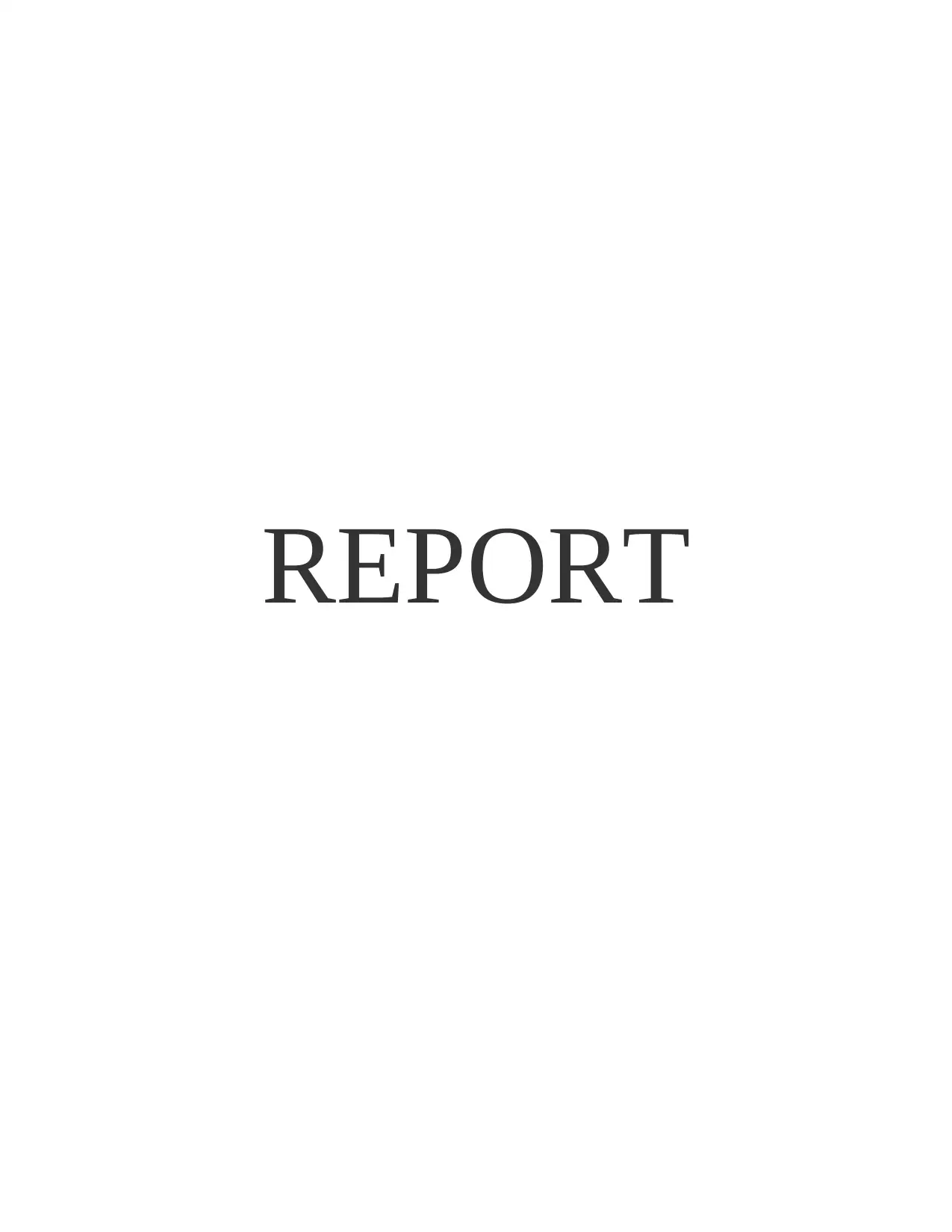
REPORT
Paraphrase This Document
Need a fresh take? Get an instant paraphrase of this document with our AI Paraphraser
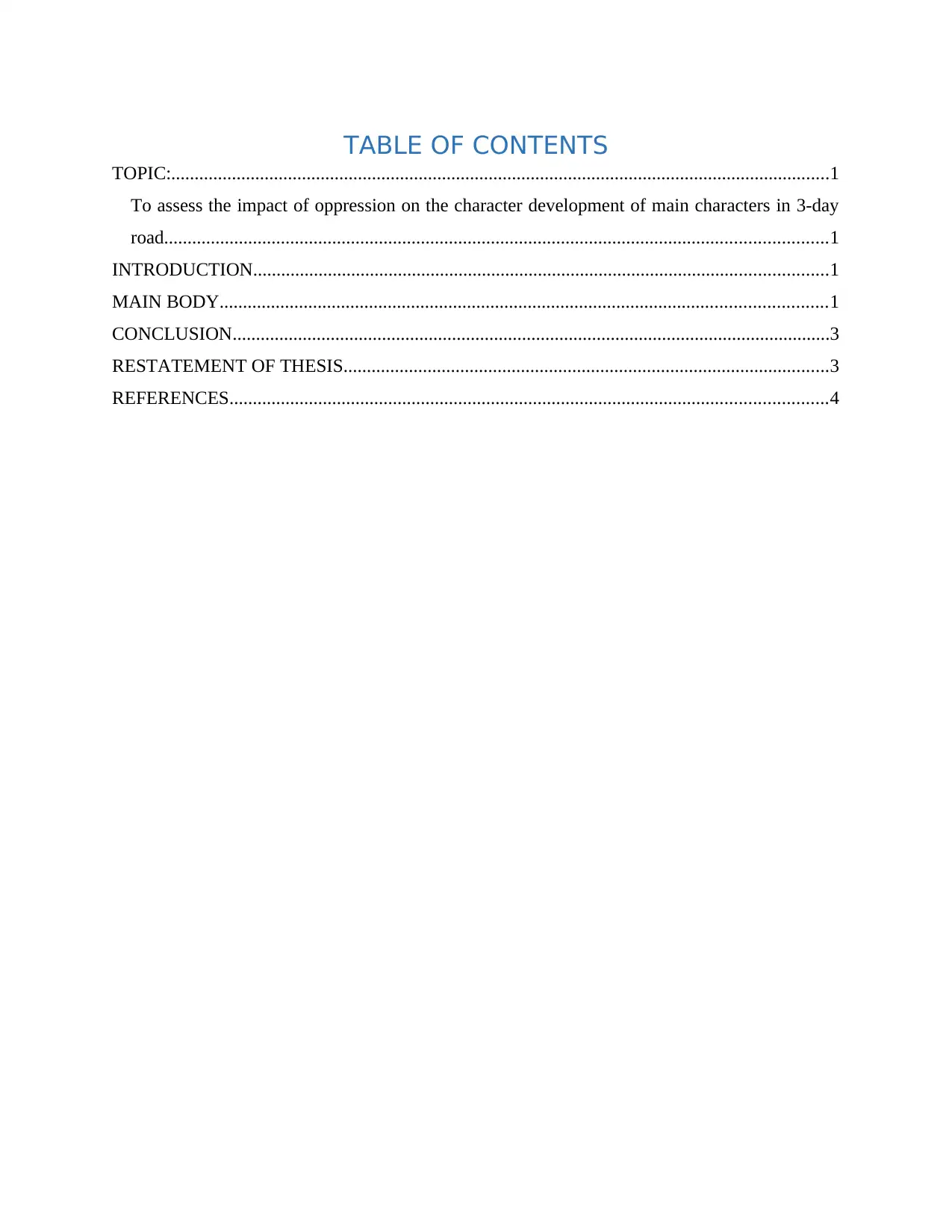
TABLE OF CONTENTS
TOPIC:.............................................................................................................................................1
To assess the impact of oppression on the character development of main characters in 3-day
road..............................................................................................................................................1
INTRODUCTION...........................................................................................................................1
MAIN BODY..................................................................................................................................1
CONCLUSION................................................................................................................................3
RESTATEMENT OF THESIS........................................................................................................3
REFERENCES................................................................................................................................4
TOPIC:.............................................................................................................................................1
To assess the impact of oppression on the character development of main characters in 3-day
road..............................................................................................................................................1
INTRODUCTION...........................................................................................................................1
MAIN BODY..................................................................................................................................1
CONCLUSION................................................................................................................................3
RESTATEMENT OF THESIS........................................................................................................3
REFERENCES................................................................................................................................4
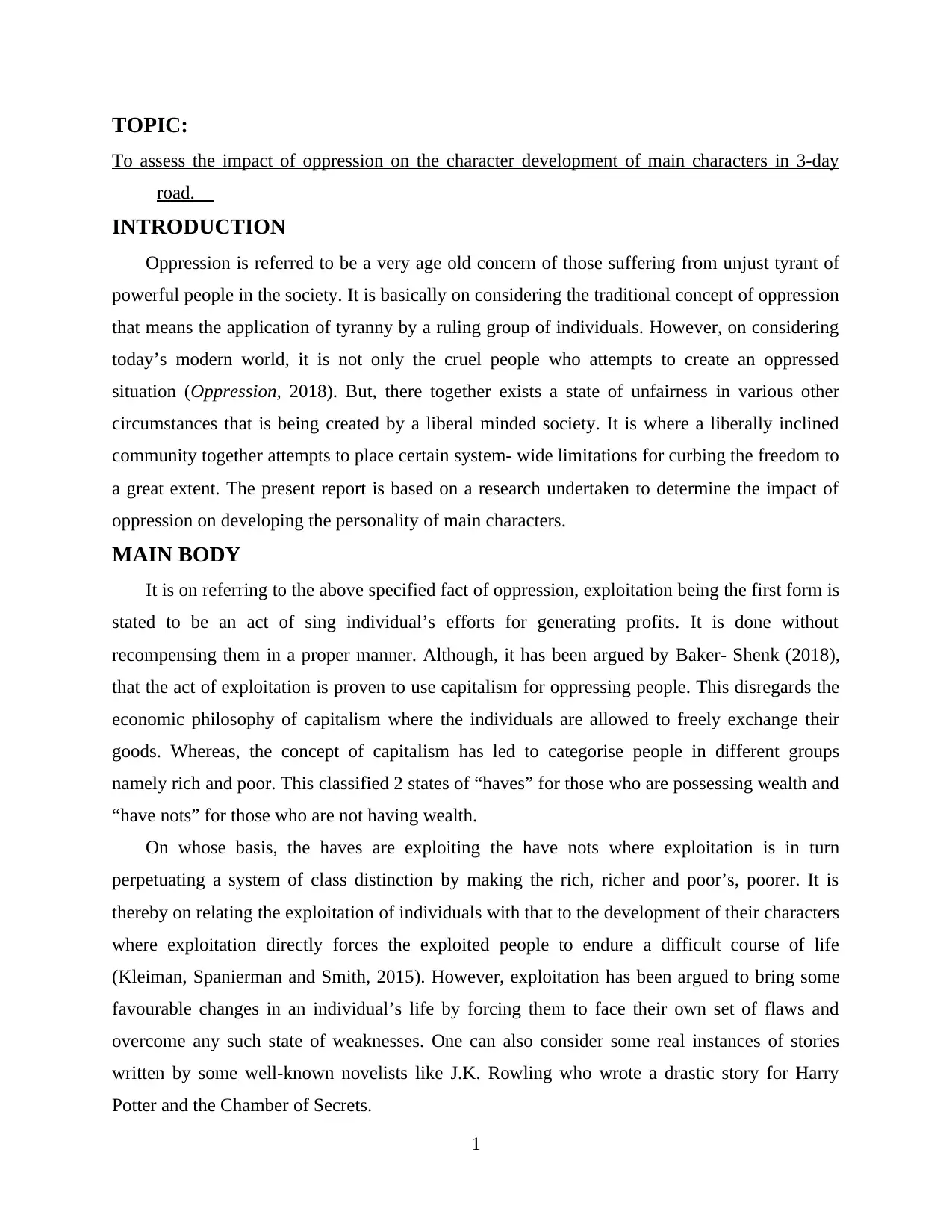
TOPIC:
To assess the impact of oppression on the character development of main characters in 3-day
road.
INTRODUCTION
Oppression is referred to be a very age old concern of those suffering from unjust tyrant of
powerful people in the society. It is basically on considering the traditional concept of oppression
that means the application of tyranny by a ruling group of individuals. However, on considering
today’s modern world, it is not only the cruel people who attempts to create an oppressed
situation (Oppression, 2018). But, there together exists a state of unfairness in various other
circumstances that is being created by a liberal minded society. It is where a liberally inclined
community together attempts to place certain system- wide limitations for curbing the freedom to
a great extent. The present report is based on a research undertaken to determine the impact of
oppression on developing the personality of main characters.
MAIN BODY
It is on referring to the above specified fact of oppression, exploitation being the first form is
stated to be an act of sing individual’s efforts for generating profits. It is done without
recompensing them in a proper manner. Although, it has been argued by Baker- Shenk (2018),
that the act of exploitation is proven to use capitalism for oppressing people. This disregards the
economic philosophy of capitalism where the individuals are allowed to freely exchange their
goods. Whereas, the concept of capitalism has led to categorise people in different groups
namely rich and poor. This classified 2 states of “haves” for those who are possessing wealth and
“have nots” for those who are not having wealth.
On whose basis, the haves are exploiting the have nots where exploitation is in turn
perpetuating a system of class distinction by making the rich, richer and poor’s, poorer. It is
thereby on relating the exploitation of individuals with that to the development of their characters
where exploitation directly forces the exploited people to endure a difficult course of life
(Kleiman, Spanierman and Smith, 2015). However, exploitation has been argued to bring some
favourable changes in an individual’s life by forcing them to face their own set of flaws and
overcome any such state of weaknesses. One can also consider some real instances of stories
written by some well-known novelists like J.K. Rowling who wrote a drastic story for Harry
Potter and the Chamber of Secrets.
1
To assess the impact of oppression on the character development of main characters in 3-day
road.
INTRODUCTION
Oppression is referred to be a very age old concern of those suffering from unjust tyrant of
powerful people in the society. It is basically on considering the traditional concept of oppression
that means the application of tyranny by a ruling group of individuals. However, on considering
today’s modern world, it is not only the cruel people who attempts to create an oppressed
situation (Oppression, 2018). But, there together exists a state of unfairness in various other
circumstances that is being created by a liberal minded society. It is where a liberally inclined
community together attempts to place certain system- wide limitations for curbing the freedom to
a great extent. The present report is based on a research undertaken to determine the impact of
oppression on developing the personality of main characters.
MAIN BODY
It is on referring to the above specified fact of oppression, exploitation being the first form is
stated to be an act of sing individual’s efforts for generating profits. It is done without
recompensing them in a proper manner. Although, it has been argued by Baker- Shenk (2018),
that the act of exploitation is proven to use capitalism for oppressing people. This disregards the
economic philosophy of capitalism where the individuals are allowed to freely exchange their
goods. Whereas, the concept of capitalism has led to categorise people in different groups
namely rich and poor. This classified 2 states of “haves” for those who are possessing wealth and
“have nots” for those who are not having wealth.
On whose basis, the haves are exploiting the have nots where exploitation is in turn
perpetuating a system of class distinction by making the rich, richer and poor’s, poorer. It is
thereby on relating the exploitation of individuals with that to the development of their characters
where exploitation directly forces the exploited people to endure a difficult course of life
(Kleiman, Spanierman and Smith, 2015). However, exploitation has been argued to bring some
favourable changes in an individual’s life by forcing them to face their own set of flaws and
overcome any such state of weaknesses. One can also consider some real instances of stories
written by some well-known novelists like J.K. Rowling who wrote a drastic story for Harry
Potter and the Chamber of Secrets.
1
⊘ This is a preview!⊘
Do you want full access?
Subscribe today to unlock all pages.

Trusted by 1+ million students worldwide
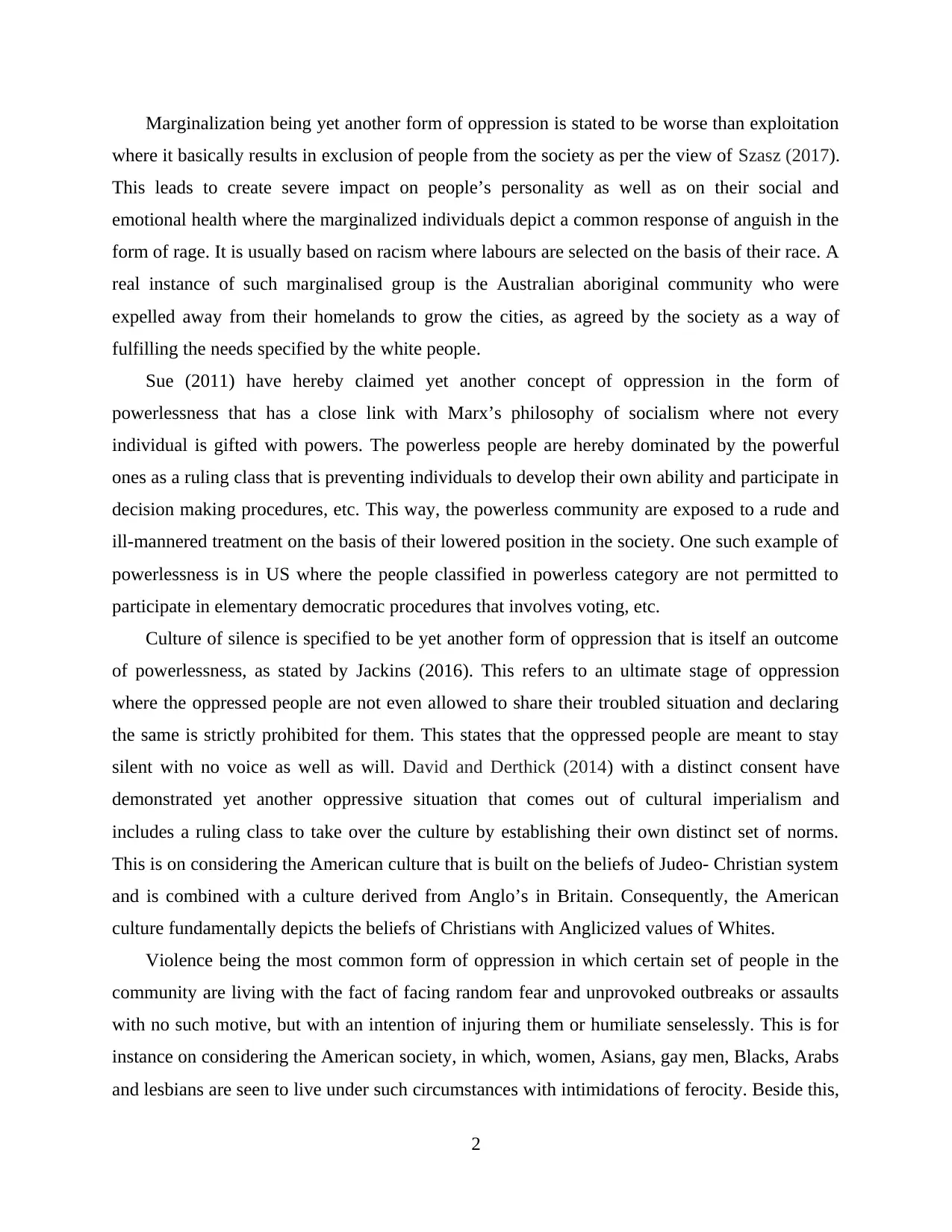
Marginalization being yet another form of oppression is stated to be worse than exploitation
where it basically results in exclusion of people from the society as per the view of Szasz (2017).
This leads to create severe impact on people’s personality as well as on their social and
emotional health where the marginalized individuals depict a common response of anguish in the
form of rage. It is usually based on racism where labours are selected on the basis of their race. A
real instance of such marginalised group is the Australian aboriginal community who were
expelled away from their homelands to grow the cities, as agreed by the society as a way of
fulfilling the needs specified by the white people.
Sue (2011) have hereby claimed yet another concept of oppression in the form of
powerlessness that has a close link with Marx’s philosophy of socialism where not every
individual is gifted with powers. The powerless people are hereby dominated by the powerful
ones as a ruling class that is preventing individuals to develop their own ability and participate in
decision making procedures, etc. This way, the powerless community are exposed to a rude and
ill-mannered treatment on the basis of their lowered position in the society. One such example of
powerlessness is in US where the people classified in powerless category are not permitted to
participate in elementary democratic procedures that involves voting, etc.
Culture of silence is specified to be yet another form of oppression that is itself an outcome
of powerlessness, as stated by Jackins (2016). This refers to an ultimate stage of oppression
where the oppressed people are not even allowed to share their troubled situation and declaring
the same is strictly prohibited for them. This states that the oppressed people are meant to stay
silent with no voice as well as will. David and Derthick (2014) with a distinct consent have
demonstrated yet another oppressive situation that comes out of cultural imperialism and
includes a ruling class to take over the culture by establishing their own distinct set of norms.
This is on considering the American culture that is built on the beliefs of Judeo- Christian system
and is combined with a culture derived from Anglo’s in Britain. Consequently, the American
culture fundamentally depicts the beliefs of Christians with Anglicized values of Whites.
Violence being the most common form of oppression in which certain set of people in the
community are living with the fact of facing random fear and unprovoked outbreaks or assaults
with no such motive, but with an intention of injuring them or humiliate senselessly. This is for
instance on considering the American society, in which, women, Asians, gay men, Blacks, Arabs
and lesbians are seen to live under such circumstances with intimidations of ferocity. Beside this,
2
where it basically results in exclusion of people from the society as per the view of Szasz (2017).
This leads to create severe impact on people’s personality as well as on their social and
emotional health where the marginalized individuals depict a common response of anguish in the
form of rage. It is usually based on racism where labours are selected on the basis of their race. A
real instance of such marginalised group is the Australian aboriginal community who were
expelled away from their homelands to grow the cities, as agreed by the society as a way of
fulfilling the needs specified by the white people.
Sue (2011) have hereby claimed yet another concept of oppression in the form of
powerlessness that has a close link with Marx’s philosophy of socialism where not every
individual is gifted with powers. The powerless people are hereby dominated by the powerful
ones as a ruling class that is preventing individuals to develop their own ability and participate in
decision making procedures, etc. This way, the powerless community are exposed to a rude and
ill-mannered treatment on the basis of their lowered position in the society. One such example of
powerlessness is in US where the people classified in powerless category are not permitted to
participate in elementary democratic procedures that involves voting, etc.
Culture of silence is specified to be yet another form of oppression that is itself an outcome
of powerlessness, as stated by Jackins (2016). This refers to an ultimate stage of oppression
where the oppressed people are not even allowed to share their troubled situation and declaring
the same is strictly prohibited for them. This states that the oppressed people are meant to stay
silent with no voice as well as will. David and Derthick (2014) with a distinct consent have
demonstrated yet another oppressive situation that comes out of cultural imperialism and
includes a ruling class to take over the culture by establishing their own distinct set of norms.
This is on considering the American culture that is built on the beliefs of Judeo- Christian system
and is combined with a culture derived from Anglo’s in Britain. Consequently, the American
culture fundamentally depicts the beliefs of Christians with Anglicized values of Whites.
Violence being the most common form of oppression in which certain set of people in the
community are living with the fact of facing random fear and unprovoked outbreaks or assaults
with no such motive, but with an intention of injuring them or humiliate senselessly. This is for
instance on considering the American society, in which, women, Asians, gay men, Blacks, Arabs
and lesbians are seen to live under such circumstances with intimidations of ferocity. Beside this,
2
Paraphrase This Document
Need a fresh take? Get an instant paraphrase of this document with our AI Paraphraser
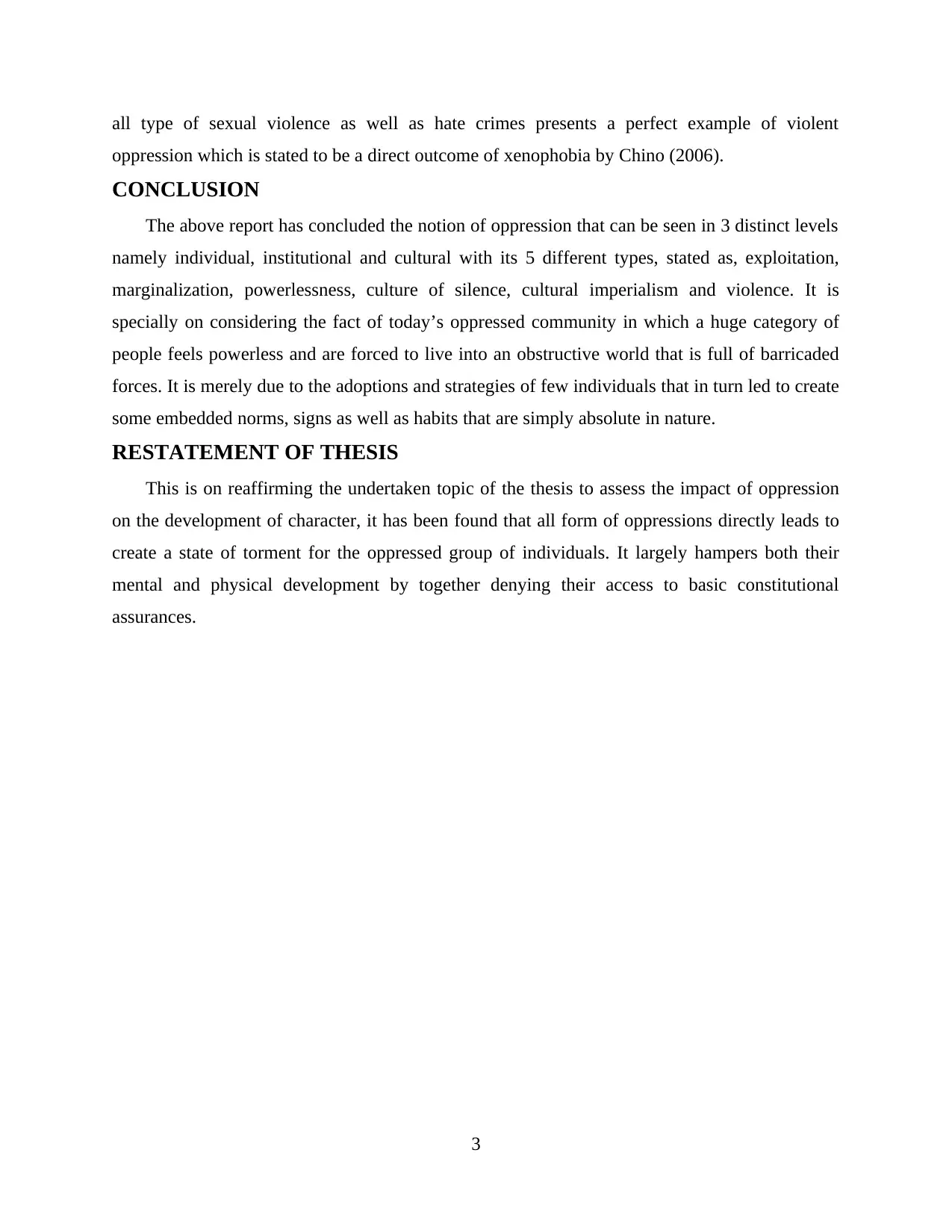
all type of sexual violence as well as hate crimes presents a perfect example of violent
oppression which is stated to be a direct outcome of xenophobia by Chino (2006).
CONCLUSION
The above report has concluded the notion of oppression that can be seen in 3 distinct levels
namely individual, institutional and cultural with its 5 different types, stated as, exploitation,
marginalization, powerlessness, culture of silence, cultural imperialism and violence. It is
specially on considering the fact of today’s oppressed community in which a huge category of
people feels powerless and are forced to live into an obstructive world that is full of barricaded
forces. It is merely due to the adoptions and strategies of few individuals that in turn led to create
some embedded norms, signs as well as habits that are simply absolute in nature.
RESTATEMENT OF THESIS
This is on reaffirming the undertaken topic of the thesis to assess the impact of oppression
on the development of character, it has been found that all form of oppressions directly leads to
create a state of torment for the oppressed group of individuals. It largely hampers both their
mental and physical development by together denying their access to basic constitutional
assurances.
3
oppression which is stated to be a direct outcome of xenophobia by Chino (2006).
CONCLUSION
The above report has concluded the notion of oppression that can be seen in 3 distinct levels
namely individual, institutional and cultural with its 5 different types, stated as, exploitation,
marginalization, powerlessness, culture of silence, cultural imperialism and violence. It is
specially on considering the fact of today’s oppressed community in which a huge category of
people feels powerless and are forced to live into an obstructive world that is full of barricaded
forces. It is merely due to the adoptions and strategies of few individuals that in turn led to create
some embedded norms, signs as well as habits that are simply absolute in nature.
RESTATEMENT OF THESIS
This is on reaffirming the undertaken topic of the thesis to assess the impact of oppression
on the development of character, it has been found that all form of oppressions directly leads to
create a state of torment for the oppressed group of individuals. It largely hampers both their
mental and physical development by together denying their access to basic constitutional
assurances.
3
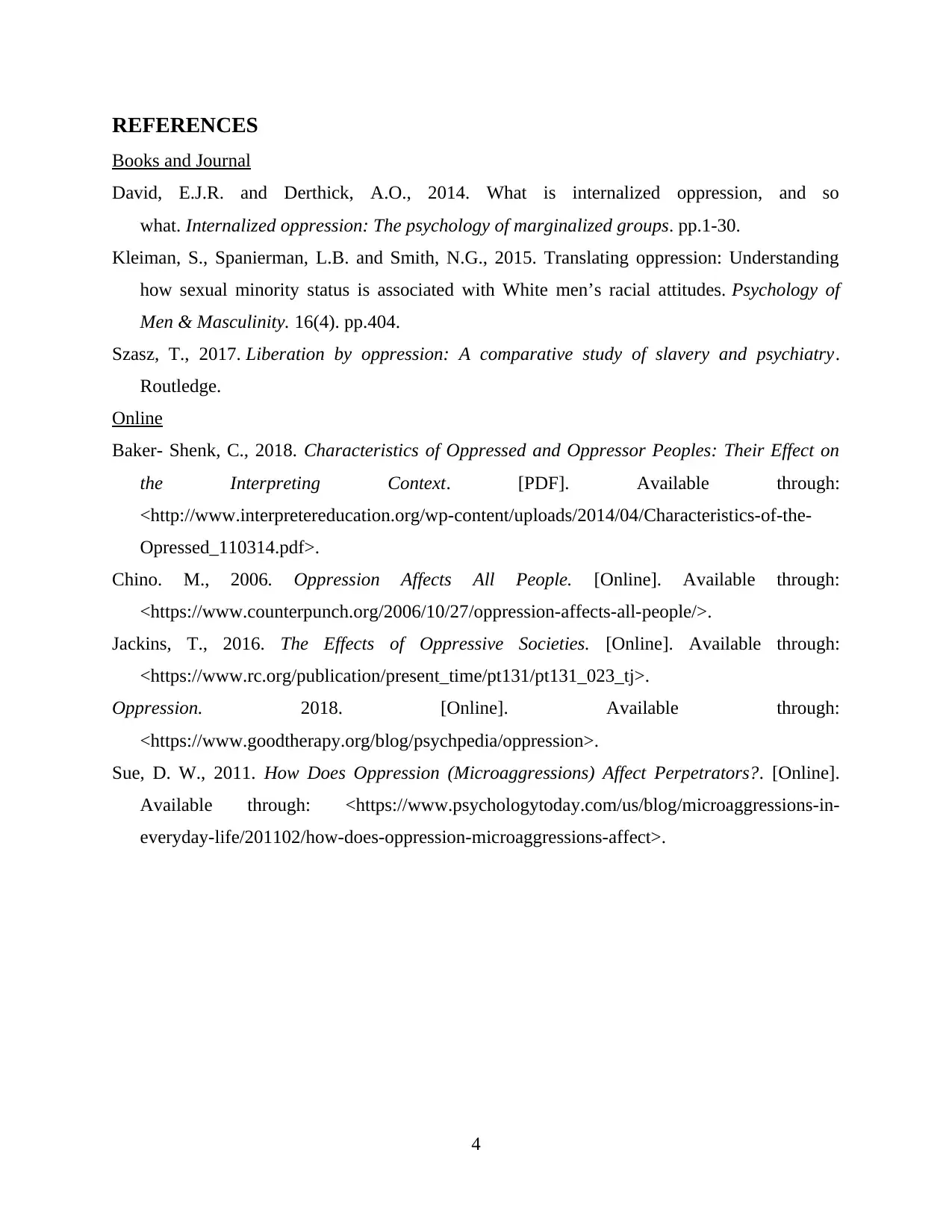
REFERENCES
Books and Journal
David, E.J.R. and Derthick, A.O., 2014. What is internalized oppression, and so
what. Internalized oppression: The psychology of marginalized groups. pp.1-30.
Kleiman, S., Spanierman, L.B. and Smith, N.G., 2015. Translating oppression: Understanding
how sexual minority status is associated with White men’s racial attitudes. Psychology of
Men & Masculinity. 16(4). pp.404.
Szasz, T., 2017. Liberation by oppression: A comparative study of slavery and psychiatry.
Routledge.
Online
Baker- Shenk, C., 2018. Characteristics of Oppressed and Oppressor Peoples: Their Effect on
the Interpreting Context. [PDF]. Available through:
<http://www.interpretereducation.org/wp-content/uploads/2014/04/Characteristics-of-the-
Opressed_110314.pdf>.
Chino. M., 2006. Oppression Affects All People. [Online]. Available through:
<https://www.counterpunch.org/2006/10/27/oppression-affects-all-people/>.
Jackins, T., 2016. The Effects of Oppressive Societies. [Online]. Available through:
<https://www.rc.org/publication/present_time/pt131/pt131_023_tj>.
Oppression. 2018. [Online]. Available through:
<https://www.goodtherapy.org/blog/psychpedia/oppression>.
Sue, D. W., 2011. How Does Oppression (Microaggressions) Affect Perpetrators?. [Online].
Available through: <https://www.psychologytoday.com/us/blog/microaggressions-in-
everyday-life/201102/how-does-oppression-microaggressions-affect>.
4
Books and Journal
David, E.J.R. and Derthick, A.O., 2014. What is internalized oppression, and so
what. Internalized oppression: The psychology of marginalized groups. pp.1-30.
Kleiman, S., Spanierman, L.B. and Smith, N.G., 2015. Translating oppression: Understanding
how sexual minority status is associated with White men’s racial attitudes. Psychology of
Men & Masculinity. 16(4). pp.404.
Szasz, T., 2017. Liberation by oppression: A comparative study of slavery and psychiatry.
Routledge.
Online
Baker- Shenk, C., 2018. Characteristics of Oppressed and Oppressor Peoples: Their Effect on
the Interpreting Context. [PDF]. Available through:
<http://www.interpretereducation.org/wp-content/uploads/2014/04/Characteristics-of-the-
Opressed_110314.pdf>.
Chino. M., 2006. Oppression Affects All People. [Online]. Available through:
<https://www.counterpunch.org/2006/10/27/oppression-affects-all-people/>.
Jackins, T., 2016. The Effects of Oppressive Societies. [Online]. Available through:
<https://www.rc.org/publication/present_time/pt131/pt131_023_tj>.
Oppression. 2018. [Online]. Available through:
<https://www.goodtherapy.org/blog/psychpedia/oppression>.
Sue, D. W., 2011. How Does Oppression (Microaggressions) Affect Perpetrators?. [Online].
Available through: <https://www.psychologytoday.com/us/blog/microaggressions-in-
everyday-life/201102/how-does-oppression-microaggressions-affect>.
4
⊘ This is a preview!⊘
Do you want full access?
Subscribe today to unlock all pages.

Trusted by 1+ million students worldwide
1 out of 6
Related Documents
Your All-in-One AI-Powered Toolkit for Academic Success.
+13062052269
info@desklib.com
Available 24*7 on WhatsApp / Email
![[object Object]](/_next/static/media/star-bottom.7253800d.svg)
Unlock your academic potential
Copyright © 2020–2026 A2Z Services. All Rights Reserved. Developed and managed by ZUCOL.





